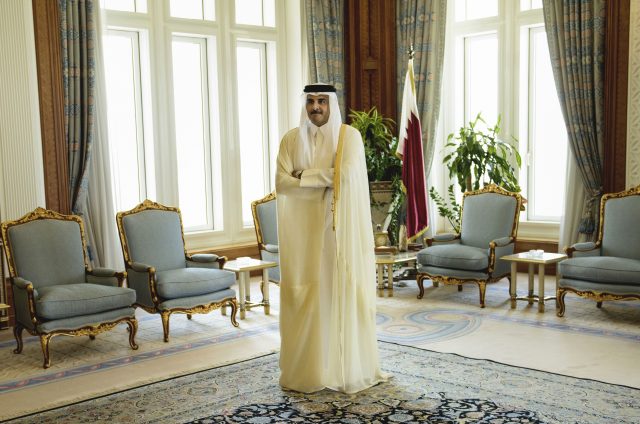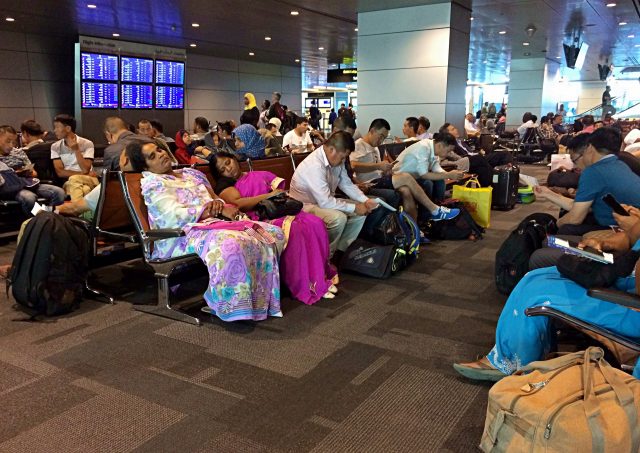
An outspoken Emirati ruling family member has raised the prospect of Qatar’s leadership changing amid a growing diplomatic crisis between it and other Arab nations attempting to isolate the energy-rich travel hub from the rest of the world.
Sultan Sooud Al Qassemi’s comments came as Emirati officials also announced those offering support to Qatar online could face years in prison and fines for offering sympathy to the country, suggesting the crisis will only intensify.
“Qataris are questioning whether this is going to end up in seeing a change in leadership itself in Qatar,” he said.
#infographic
Foreign Minister @MBA_AlThani_ to "CNN": Qatar is ready for dialogue to resolve the diplomatic crisis pic.twitter.com/GQkVd03CrZ— MOFA – Qatar (@MofaQatar_EN) June 7, 2017
“So it is a very serious issue. Again, this is Qataris speaking to international media wondering whether this is possible at all. Doha now is completely isolated. Doha now needs to take serious steps very rapidly to placate not only their neighbours but also their allies around the world.”
Bahrain, Egypt and the United Arab Emirates were among those who joined Saudi Arabia on Monday in cutting diplomatic ties with Qatar. They alleged Qatar funds terror groups and has a worryingly close relationship with Iran, a nation with which it shares its vast offshore natural gas field.

Qatar has long denied funding extremists, and its foreign minister has struck a defiant tone about the crisis in interviews.
The Arab countries have blocked Qatari vessels from entering their air space, as well as using their seaports as Saudi Arabia has closed off its land border.
Among others joining them are Yemen’s internationally-backed government, which has lost the capital and large portions of the war-torn country. The Maldives and one of conflict-ridden Libya’s competing governments have also cut ties to Doha.

Late on Tuesday night, the Jordanian government announced it was reducing its level of diplomatic representation in Qatar and cancelling the local registration for Al-Jazeera TV. And on Wednesday, the African nation of Mauritania joined them.
The Gulf countries have ordered their citizens out of Qatar and given Qataris abroad 14 days to return home. The countries also said they would eject Qatar’s diplomats.
Qatar Airways, one of the region’s major long-haul carriers, has suspended all flights to Saudi Arabia, the United Arab Emirates, Egypt and Bahrain until further notice. It has increasingly been sending flights over Iran and Turkey to avoid Saudi and Egyptian airspace.
Qatar Airways flights operations are as normal, three additional flights to carry stranded Qatar Airways passengers from KSA to Muscat pic.twitter.com/e5HJqHL46l
— Qatar Airways (@qatarairways) June 6, 2017
Mr Al Qassemi, who previously wrote a column describing steps Qatar would need to take, said the crisis will only escalate if Doha does not back down.
He said Qatar needs to shut down or limit its Al-Jazeera news network, as well as stopping funding extremist groups and others.
His comments took on further strength as the UAE’s justice ministry warned social media users that they can face three to 15 years in prison time and massive fines for offering sympathy for Qatar.
Mr Al Qassemi also warned Qatar should not rely on hosting 10,000 American troops at its al-Udeid Air Base as protection against the Arab nations lined up against it.
During my recent trip to the Middle East I stated that there can no longer be funding of Radical Ideology. Leaders pointed to Qatar – look!
— Donald J. Trump (@realDonaldTrump) June 6, 2017
So good to see the Saudi Arabia visit with the King and 50 countries already paying off. They said they would take a hard line on funding…
— Donald J. Trump (@realDonaldTrump) June 6, 2017
…extremism, and all reference was pointing to Qatar. Perhaps this will be the beginning of the end to the horror of terrorism!
— Donald J. Trump (@realDonaldTrump) June 6, 2017
US President Donald Trump made a series of tweets on Tuesday calling into question his commitment to the peninsular nation after earlier telling Qatar’s ruling emir Sheikh Tamim bin Hamad Al-Thani that “we’ve been friends now for a long time”.
Mr Al Qassemi said: “The Qataris should not count on that base as being a guarantee of sort of American protection when it comes to conflict with Saudi Arabia. I think the Americans would choose to side with Saudi Arabia over any other country in the region.”


Comments: Our rules
We want our comments to be a lively and valuable part of our community - a place where readers can debate and engage with the most important local issues. The ability to comment on our stories is a privilege, not a right, however, and that privilege may be withdrawn if it is abused or misused.
Please report any comments that break our rules.
Read the rules hereLast Updated:
Report this comment Cancel